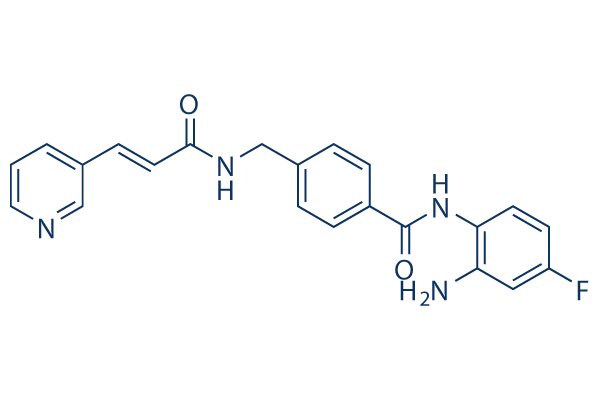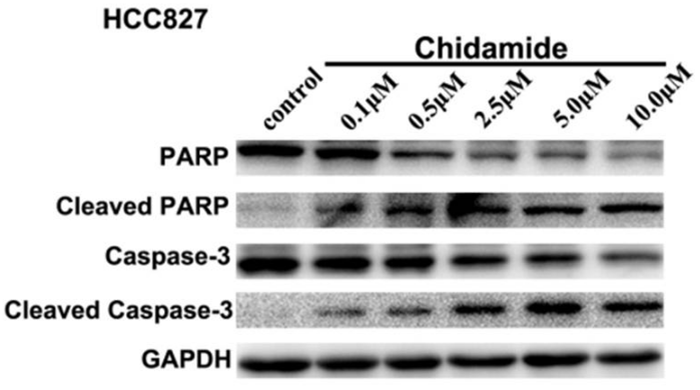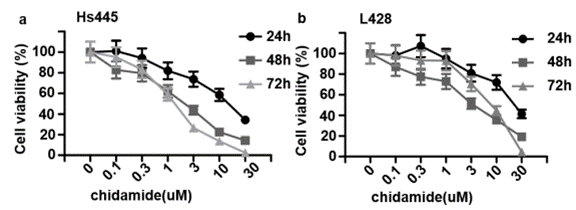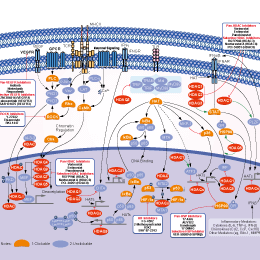
- Bioactive Compounds
- By Signaling Pathways
- PI3K/Akt/mTOR
- Epigenetics
- Methylation
- Immunology & Inflammation
- Protein Tyrosine Kinase
- Angiogenesis
- Apoptosis
- Autophagy
- ER stress & UPR
- JAK/STAT
- MAPK
- Cytoskeletal Signaling
- Cell Cycle
- TGF-beta/Smad
- DNA Damage/DNA Repair
- Compound Libraries
- Popular Compound Libraries
- Customize Library
- Clinical and FDA-approved Related
- Bioactive Compound Libraries
- Inhibitor Related
- Natural Product Related
- Metabolism Related
- Cell Death Related
- By Signaling Pathway
- By Disease
- Anti-infection and Antiviral Related
- Neuronal and Immunology Related
- Fragment and Covalent Related
- FDA-approved Drug Library
- FDA-approved & Passed Phase I Drug Library
- Preclinical/Clinical Compound Library
- Bioactive Compound Library-I
- Bioactive Compound Library-Ⅱ
- Kinase Inhibitor Library
- Express-Pick Library
- Natural Product Library
- Human Endogenous Metabolite Compound Library
- Alkaloid Compound LibraryNew
- Angiogenesis Related compound Library
- Anti-Aging Compound Library
- Anti-alzheimer Disease Compound Library
- Antibiotics compound Library
- Anti-cancer Compound Library
- Anti-cancer Compound Library-Ⅱ
- Anti-cancer Metabolism Compound Library
- Anti-Cardiovascular Disease Compound Library
- Anti-diabetic Compound Library
- Anti-infection Compound Library
- Antioxidant Compound Library
- Anti-parasitic Compound Library
- Antiviral Compound Library
- Apoptosis Compound Library
- Autophagy Compound Library
- Calcium Channel Blocker LibraryNew
- Cambridge Cancer Compound Library
- Carbohydrate Metabolism Compound LibraryNew
- Cell Cycle compound library
- CNS-Penetrant Compound Library
- Covalent Inhibitor Library
- Cytokine Inhibitor LibraryNew
- Cytoskeletal Signaling Pathway Compound Library
- DNA Damage/DNA Repair compound Library
- Drug-like Compound Library
- Endoplasmic Reticulum Stress Compound Library
- Epigenetics Compound Library
- Exosome Secretion Related Compound LibraryNew
- FDA-approved Anticancer Drug LibraryNew
- Ferroptosis Compound Library
- Flavonoid Compound Library
- Fragment Library
- Glutamine Metabolism Compound Library
- Glycolysis Compound Library
- GPCR Compound Library
- Gut Microbial Metabolite Library
- HIF-1 Signaling Pathway Compound Library
- Highly Selective Inhibitor Library
- Histone modification compound library
- HTS Library for Drug Discovery
- Human Hormone Related Compound LibraryNew
- Human Transcription Factor Compound LibraryNew
- Immunology/Inflammation Compound Library
- Inhibitor Library
- Ion Channel Ligand Library
- JAK/STAT compound library
- Lipid Metabolism Compound LibraryNew
- Macrocyclic Compound Library
- MAPK Inhibitor Library
- Medicine Food Homology Compound Library
- Metabolism Compound Library
- Methylation Compound Library
- Mouse Metabolite Compound LibraryNew
- Natural Organic Compound Library
- Neuronal Signaling Compound Library
- NF-κB Signaling Compound Library
- Nucleoside Analogue Library
- Obesity Compound Library
- Oxidative Stress Compound LibraryNew
- Plant Extract Library
- Phenotypic Screening Library
- PI3K/Akt Inhibitor Library
- Protease Inhibitor Library
- Protein-protein Interaction Inhibitor Library
- Pyroptosis Compound Library
- Small Molecule Immuno-Oncology Compound Library
- Mitochondria-Targeted Compound LibraryNew
- Stem Cell Differentiation Compound LibraryNew
- Stem Cell Signaling Compound Library
- Natural Phenol Compound LibraryNew
- Natural Terpenoid Compound LibraryNew
- TGF-beta/Smad compound library
- Traditional Chinese Medicine Library
- Tyrosine Kinase Inhibitor Library
- Ubiquitination Compound Library
-
Cherry Picking
You can personalize your library with chemicals from within Selleck's inventory. Build the right library for your research endeavors by choosing from compounds in all of our available libraries.
Please contact us at [email protected] to customize your library.
You could select:
- Antibodies
- Bioreagents
- qPCR
- 2x SYBR Green qPCR Master Mix
- 2x SYBR Green qPCR Master Mix(Low ROX)
- 2x SYBR Green qPCR Master Mix(High ROX)
- Protein Assay
- Protein A/G Magnetic Beads for IP
- Anti-Flag magnetic beads
- Anti-Flag Affinity Gel
- Anti-Myc magnetic beads
- Anti-HA magnetic beads
- Magnetic Separator
- Poly DYKDDDDK Tag Peptide lyophilized powder
- Protease Inhibitor Cocktail
- Protease Inhibitor Cocktail (EDTA-Free, 100X in DMSO)
- Phosphatase Inhibitor Cocktail (2 Tubes, 100X)
- Cell Biology
- Cell Counting Kit-8 (CCK-8)
- Animal Experiment
- Mouse Direct PCR Kit (For Genotyping)
- New Products
- Contact Us
Tucidinostat (Chidamide)
Synonyms: HBI-8000, CS-055
Tucidinostat (Chidamide, HBI-8000, CS-055) is a low nanomolar inhibitor of HDAC1, 2, 3, and 10, the HDAC isotypes well documented to be associated with the malignant phenotype with IC50 values of 95, 160, 67, 78 nM for HDAC1, 2, 3, 10 respectively.

Tucidinostat (Chidamide) Chemical Structure
CAS No. 1616493-44-7
Purity & Quality Control
Batch:
Purity:
99.99%
99.99
Tucidinostat (Chidamide) Related Products
Signaling Pathway
Cell Data
| Cell Lines | Assay Type | Concentration | Incubation Time | Formulation | Activity Description | PMID |
|---|---|---|---|---|---|---|
| Sf9 | Function assay | 5 mins | Inhibition of recombinant human full length HDAC1 expressed in baculovirus infected Sf9 insect cells using biotinylated lysine 9 acetylated histone H3 (1 to 21 residues) as substrate incubated for 5 mins followed by substrate addition measured after 60 mi, IC50 = 0.112 μM. | 28835797 | ||
| EBC1 | Antiproliferative assay | 72 hrs | Antiproliferative activity against human EBC1 cells after 72 hrs by SRB assay, IC50 = 2.9 μM. | 28835797 | ||
| HCT116 | Antiproliferative assay | 72 hrs | Antiproliferative activity against human HCT116 cells after 72 hrs by SRB assay, IC50 = 7.8 μM. | 28835797 | ||
| HL60 | Growth inhibition assay | 48 hrs | Growth inhibition of human HL60 cells incubated for 48 hrs by MTS method, GI50 = 0.4 μM. | ChEMBL | ||
| Jurkat | Growth inhibition assay | 48 hrs | Growth inhibition of human Jurkat cells incubated for 48 hrs by MTS method, GI50 = 1.5 μM. | ChEMBL | ||
| hematopoietic malignant cells | Cytotoxicity assay | Cytotoxicity against human hematopoietic malignant cells assessed as growth inhibition, GI50 = 1.86 μM. | ChEMBL | |||
| U2OS | Growth inhibition assay | 48 hrs | Growth inhibition of human U2OS cells incubated for 48 hrs by MTS method, GI50 = 2 μM. | ChEMBL | ||
| HepG2 | Growth inhibition assay | 48 hrs | Growth inhibition of human HepG2 cells incubated for 48 hrs by MTS method, GI50 = 4 μM. | ChEMBL | ||
| LNCAP | Growth inhibition assay | 48 hrs | Growth inhibition of human LNCAP cells incubated for 48 hrs by MTS method, GI50 = 4 μM. | ChEMBL | ||
| Raji | Growth inhibition assay | 48 hrs | Growth inhibition of human Raji cells incubated for 48 hrs by MTS method, GI50 = 4 μM. | ChEMBL | ||
| MCF7 | Growth inhibition assay | 48 hrs | Growth inhibition of human MCF7 cells incubated for 48 hrs by MTS method, GI50 = 5 μM. | ChEMBL | ||
| 28SC | Growth inhibition assay | 48 hrs | Growth inhibition of human 28SC cells incubated for 48 hrs by MTS method, GI50 = 5.8 μM. | ChEMBL | ||
| PANC1 | Growth inhibition assay | 48 hrs | Growth inhibition of human PANC1 cells incubated for 48 hrs by MTS method, GI50 = 6.3 μM. | ChEMBL | ||
| human solid tumor cells | Cytotoxicity assay | Cytotoxicity against human solid tumor cells assessed as growth inhibition, GI50 = 6.65 μM. | ChEMBL | |||
| HeLa | Function assay | 10 mins | Inhibition of HDAC enzymatic activity in human HeLa cells incubated for 10 mins in presence of substrate by colorimetric activity assay, IC50 = 7.2 μM. | ChEMBL | ||
| MDA-MB-231 | Growth inhibition assay | 48 hrs | Growth inhibition of human MDA-MB-231 cells incubated for 48 hrs by MTS method, GI50 = 7.9 μM. | ChEMBL | ||
| SMMC7721 | Growth inhibition assay | 48 hrs | Growth inhibition of human SMMC7721 cells incubated for 48 hrs by MTS method, GI50 = 16 μM. | ChEMBL | ||
| DU145 | Growth inhibition assay | 48 hrs | Growth inhibition of human DU145 cells incubated for 48 hrs by MTS method, GI50 = 25 μM. | ChEMBL | ||
| HeLa | Growth inhibition assay | 48 hrs | Growth inhibition of human HeLa cells incubated for 48 hrs by MTS method, GI50 = 40 μM. | ChEMBL | ||
| U2OS | Function assay | 1 uM | 24 hrs | Activation of PPARG (unknown origin) expressed in human U2OS cells at 1 uM in presence of 10 uM rosiglitazone incubated for 24 hrs by luciferase reporter gene assay | ChEMBL | |
| U2OS | Function assay | 1 uM | 24 hrs | Activation of ERbeta (unknown origin) expressed in human U2OS cells at 1 uM in presence of 0.01 uM E2 incubated for 24 hrs by luciferase reporter gene assay | ChEMBL | |
| U2OS | Function assay | 1 uM | 24 hrs | Activation of glulcocorticoid receptor (unknown origin) expressed in human U2OS cells at 1 uM in presence of 0.1 uM dexamethasone incubated for 24 hrs by luciferase reporter gene assay | ChEMBL | |
| U2OS | Function assay | 1 uM | 24 hrs | Activation of ERalpha (unknown origin) expressed in human U2OS cells at 1 uM in presence of 0.01 uM E2 incubated for 24 hrs by luciferase reporter gene assay | ChEMBL | |
| U2OS | Function assay | 1 uM | 24 hrs | Activation of glulcocorticoid receptor (unknown origin) expressed in human U2OS cells at 1 uM incubated for 24 hrs by luciferase reporter gene assay | ChEMBL | |
| U2OS | Function assay | 1 uM | 24 hrs | Activation of PPARG (unknown origin) expressed in human U2OS cells at 1 uM incubated for 24 hrs by luciferase reporter gene assay | ChEMBL | |
| U2OS | Function assay | 1 uM | 24 hrs | Activation of ERalpha (unknown origin) expressed in human U2OS cells at 1 uM incubated for 24 hrs by luciferase reporter gene assay | ChEMBL | |
| U2OS | Function assay | 1 uM | 24 hrs | Activation of ERbeta (unknown origin) expressed in human U2OS cells at 1 uM incubated for 24 hrs by luciferase reporter gene assay | ChEMBL | |
| Click to View More Cell Line Experimental Data | ||||||
Biological Activity
| Description | Tucidinostat (Chidamide, HBI-8000, CS-055) is a low nanomolar inhibitor of HDAC1, 2, 3, and 10, the HDAC isotypes well documented to be associated with the malignant phenotype with IC50 values of 95, 160, 67, 78 nM for HDAC1, 2, 3, 10 respectively. | ||||||||
|---|---|---|---|---|---|---|---|---|---|
| Targets |
|
| In vitro | ||||
| In vitro | Chidamide inhibits class I HDACs 1-3, as well as class IIb HDAC10, at low nanomolar concentrations. Chidamide significantly induces histone H3 acetylation in both HeLa human cervical adenocarcinoma cells and human PBMC. Cell growth inhibition studies performed with 18 human-derived tumor cell lines demonstrate that chidamide and MS-275 similarly inhibit the in vitro growth of most, but not all, tumor cells in the low micromolar concentration range. However, chidamide, and to a lesser extent MS-275, is significantly less toxic to normal cells from human fetal kidney (CCC-HEK) and liver (CCC-HEL), indicating a differential cytotoxic response of normal cells versus cancerous cells to chidamide[1]. |
|||
|---|---|---|---|---|
| Cell Research | Cell lines | PBMC effector cells | ||
| Concentrations | 0-400 nM | |||
| Incubation Time | 0-400 nM | |||
| Method | Isolated PBMC effector cells are seeded into 6-well plates (6 x 106 cells/well) and treated with chidamide at different concentrations (0-400 nM) for different times (24-72 h). |
|||
| Experimental Result Images | Methods | Biomarkers | Images | PMID |
| Western blot | PARP / Cleaved PARP / Caspase-3 / Cleaved caspase-3 p-EGFR / EGFR / p-STAT3 / STAT3 / p-AKT / AKT / p-AMPK / MAPK Ace-H3K18 / Ace-H3K9 / Ac-H4K8 Mcl-1 / Myc / Bcl-xl / p21 / p27 / CDK6 / CDK4 / Cyclin D2 HDAC1 / HDAC2 / HDAC3 / acetyl-H3 / acetyl-H4 |

|
30854137 | |
| Growth inhibition assay | Cell viability |

|
29100410 | |
| In Vivo | ||
| In vivo | In HCT-8 colorectal carcinoma mice xenografts, Chidamide shows in vivo antitumor activity. However, chidamide is well-tolerated at the above doses in the tumor-bearing animals, whereas the control drugs cause significant weight loss[1]. |
|
|---|---|---|
| Animal Research | Animal Models | Athymic nude mice (BALB/c-nu) |
| Dosages | 12.5-50 mg/kg | |
| Administration | oral | |
| NCT Number | Recruitment | Conditions | Sponsor/Collaborators | Start Date | Phases |
|---|---|---|---|---|---|
| NCT05586841 | Not yet recruiting | HR+/HER2- Advanced Breast Cancer |
Beijing 302 Hospital |
November 1 2022 | Phase 1 |
| NCT05141357 | Terminated | Non Small Cell Lung Cancer |
HUYABIO International LLC. |
March 14 2022 | Phase 2 |
| NCT04994210 | Recruiting | Safety and Efficacy |
Sun Yat-sen University |
October 4 2021 | Phase 2 |
| NCT05140616 | Recruiting | Safety and Efficacy |
The First Affiliated Hospital of Soochow University |
May 31 2021 | Phase 1|Phase 2 |
| NCT04651127 | Unknown status | Cervical Cancer|Cervix Cancer|Cervix Neoplasm |
Sun Yat-sen University |
November 9 2020 | Phase 1|Phase 2 |
Chemical Information & Solubility
| Molecular Weight | 390.41 | Formula | C22H19FN4O2 |
| CAS No. | 1616493-44-7 | SDF | Download Tucidinostat (Chidamide) SDF |
| Smiles | C1=CC(=CN=C1)C=CC(=O)NCC2=CC=C(C=C2)C(=O)NC3=C(C=C(C=C3)F)N | ||
| Storage (From the date of receipt) | |||
|
In vitro |
DMSO : 78 mg/mL ( (199.78 mM) Moisture-absorbing DMSO reduces solubility. Please use fresh DMSO.) Ethanol : 1 mg/mL Water : Insoluble |
Molecular Weight Calculator |
|
In vivo Add solvents to the product individually and in order. |
In vivo Formulation Calculator |
||||
Preparing Stock Solutions
Molarity Calculator
In vivo Formulation Calculator (Clear solution)
Step 1: Enter information below (Recommended: An additional animal making an allowance for loss during the experiment)
mg/kg
g
μL
Step 2: Enter the in vivo formulation (This is only the calculator, not formulation. Please contact us first if there is no in vivo formulation at the solubility Section.)
% DMSO
%
% Tween 80
% ddH2O
%DMSO
%
Calculation results:
Working concentration: mg/ml;
Method for preparing DMSO master liquid: mg drug pre-dissolved in μL DMSO ( Master liquid concentration mg/mL, Please contact us first if the concentration exceeds the DMSO solubility of the batch of drug. )
Method for preparing in vivo formulation: Take μL DMSO master liquid, next addμL PEG300, mix and clarify, next addμL Tween 80, mix and clarify, next add μL ddH2O, mix and clarify.
Method for preparing in vivo formulation: Take μL DMSO master liquid, next add μL Corn oil, mix and clarify.
Note: 1. Please make sure the liquid is clear before adding the next solvent.
2. Be sure to add the solvent(s) in order. You must ensure that the solution obtained, in the previous addition, is a clear solution before proceeding to add the next solvent. Physical methods such
as vortex, ultrasound or hot water bath can be used to aid dissolving.
Tech Support
Answers to questions you may have can be found in the inhibitor handling instructions. Topics include how to prepare stock solutions, how to store inhibitors, and issues that need special attention for cell-based assays and animal experiments.
Tel: +1-832-582-8158 Ext:3
If you have any other enquiries, please leave a message.
* Indicates a Required Field
Tags: buy Tucidinostat (Chidamide) | Tucidinostat (Chidamide) supplier | purchase Tucidinostat (Chidamide) | Tucidinostat (Chidamide) cost | Tucidinostat (Chidamide) manufacturer | order Tucidinostat (Chidamide) | Tucidinostat (Chidamide) distributor







































